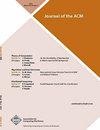Pliability and Approximating Max-CSPs
IF 2.5
2区 计算机科学
Q2 COMPUTER SCIENCE, HARDWARE & ARCHITECTURE
引用次数: 10
Abstract
We identify a sufficient condition, treewidth-pliability , that gives a polynomial-time algorithm for an arbitrarily good approximation of the optimal value in a large class of Max-2-CSPs parameterised by the class of allowed constraint graphs (with arbitrary constraints on an unbounded alphabet). Our result applies more generally to the maximum homomorphism problem between two rational-valued structures. The condition unifies the two main approaches for designing a polynomial-time approximation scheme. One is Baker’s layering technique, which applies to sparse graphs such as planar or excluded-minor graphs. The other is based on Szemerédi’s regularity lemma and applies to dense graphs. We extend the applicability of both techniques to new classes of Max-CSPs. On the other hand, we prove that the condition cannot be used to find solutions (as opposed to approximating the optimal value) in general. Treewidth-pliability turns out to be a robust notion that can be defined in several equivalent ways, including characterisations via size, treedepth, or the Hadwiger number. We show connections to the notions of fractional-treewidth-fragility from structural graph theory, hyperfiniteness from the area of property testing, and regularity partitions from the theory of dense graph limits. These may be of independent interest. In particular we show that a monotone class of graphs is hyperfinite if and only if it is fractionally-treewidth-fragile and has bounded degree.柔韧性与max - csp近似
我们确定了一个充分条件,树宽柔顺性,它给出了一个多项式时间算法,可以在允许约束图(在无界字母上具有任意约束)参数化的一大类max -2- csp中任意逼近最优值。我们的结果更普遍地适用于两个有理值结构之间的极大同态问题。该条件统一了设计多项式时间逼近格式的两种主要方法。一种是Baker的分层技术,它适用于稀疏图,如平面图或排除次要图。另一种是基于szemersamedi的正则引理,并应用于密集图。我们将这两种技术的适用性扩展到新的max - csp类。另一方面,我们证明了该条件一般不能用于寻找解(与逼近最优值相反)。树宽柔韧性是一个强大的概念,可以用几种等效的方式来定义,包括通过大小、树深或哈维格数来表征。我们展示了与结构图理论中的分数-树宽-脆弱性概念的联系,与性能测试领域的超有限性的联系,与密集图极限理论中的正则划分的联系。这些可能是独立的利益。特别地,我们证明了一类单调图是超有限的当且仅当它是分数-树宽-脆弱的并且有界度。
本文章由计算机程序翻译,如有差异,请以英文原文为准。
求助全文
约1分钟内获得全文
求助全文
来源期刊

Journal of the ACM
工程技术-计算机:理论方法
CiteScore
7.50
自引率
0.00%
发文量
51
审稿时长
3 months
期刊介绍:
The best indicator of the scope of the journal is provided by the areas covered by its Editorial Board. These areas change from time to time, as the field evolves. The following areas are currently covered by a member of the Editorial Board: Algorithms and Combinatorial Optimization; Algorithms and Data Structures; Algorithms, Combinatorial Optimization, and Games; Artificial Intelligence; Complexity Theory; Computational Biology; Computational Geometry; Computer Graphics and Computer Vision; Computer-Aided Verification; Cryptography and Security; Cyber-Physical, Embedded, and Real-Time Systems; Database Systems and Theory; Distributed Computing; Economics and Computation; Information Theory; Logic and Computation; Logic, Algorithms, and Complexity; Machine Learning and Computational Learning Theory; Networking; Parallel Computing and Architecture; Programming Languages; Quantum Computing; Randomized Algorithms and Probabilistic Analysis of Algorithms; Scientific Computing and High Performance Computing; Software Engineering; Web Algorithms and Data Mining
 求助内容:
求助内容: 应助结果提醒方式:
应助结果提醒方式:


